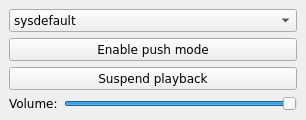Audio Output Example¶
Audio Output demonstrates the basic use cases of QAudioOutput.
This example provides a tone generator to supply continuous audio playback. The first button allows pause and resume of the playback, and the second button allows toggling between push and pull modes of operation.

"""PySide6 port of the multimedia/audiooutput example from Qt v5.x, originating from PyQt"""
import sys
from math import pi, sin
from struct import pack
from PySide6.QtCore import (QByteArray, QIODevice, Qt, QSysInfo, QTimer,
qWarning, Slot)
from PySide6.QtMultimedia import (QAudio, QAudioDevice, QAudioFormat,
QAudioSink, QMediaDevices)
from PySide6.QtWidgets import (QApplication, QComboBox, QHBoxLayout, QLabel,
QMainWindow, QPushButton, QSlider,
QVBoxLayout, QWidget)
class Generator(QIODevice):
def __init__(self, format, durationUs, sampleRate, parent):
super().__init__(parent)
self.m_pos = 0
self.m_buffer = QByteArray()
self.generate_data(format, durationUs, sampleRate)
def start(self):
self.open(QIODevice.ReadOnly)
def stop(self):
self.m_pos = 0
self.close()
def generate_data(self, fmt, durationUs, sampleRate):
pack_format = ''
sample_size = fmt.bytesPerSample() * 8
if sample_size == 8:
if fmt.sampleFormat() == QAudioFormat.UInt8:
scaler = lambda x: ((1.0 + x) / 2 * 255)
pack_format = 'B'
elif fmt.sampleFormat() == QAudioFormat.Int16:
scaler = lambda x: x * 127
pack_format = 'b'
elif sample_size == 16:
little_endian = QSysInfo.ByteOrder == QSysInfo.LittleEndian
if fmt.sampleFormat() == QAudioFormat.UInt8:
scaler = lambda x: (1.0 + x) / 2 * 65535
pack_format = '<H' if little_endian else '>H'
elif fmt.sampleFormat() == QAudioFormat.Int16:
scaler = lambda x: x * 32767
pack_format = '<h' if little_endian else '>h'
assert(pack_format != '')
channel_bytes = fmt.bytesPerSample()
sample_bytes = fmt.channelCount() * channel_bytes
length = (fmt.sampleRate() * fmt.channelCount() * channel_bytes) * durationUs // 100000
self.m_buffer.clear()
sample_index = 0
factor = 2 * pi * sampleRate / fmt.sampleRate()
while length != 0:
x = sin((sample_index % fmt.sampleRate()) * factor)
packed = pack(pack_format, int(scaler(x)))
for _ in range(fmt.channelCount()):
self.m_buffer.append(packed)
length -= channel_bytes
sample_index += 1
def readData(self, maxlen):
data = QByteArray()
total = 0
while maxlen > total:
chunk = min(self.m_buffer.size() - self.m_pos, maxlen - total)
data.append(self.m_buffer.mid(self.m_pos, chunk))
self.m_pos = (self.m_pos + chunk) % self.m_buffer.size()
total += chunk
return data.data()
def writeData(self, data):
return 0
def bytesAvailable(self):
return self.m_buffer.size() + super(Generator, self).bytesAvailable()
class AudioTest(QMainWindow):
PUSH_MODE_LABEL = "Enable push mode"
PULL_MODE_LABEL = "Enable pull mode"
SUSPEND_LABEL = "Suspend playback"
RESUME_LABEL = "Resume playback"
DURATION_SECONDS = 1
TONE_SAMPLE_RATE_HZ = 600
DATA_SAMPLE_RATE_HZ = 44100
def __init__(self, devices):
super().__init__()
self.m_devices = devices
self.m_device = self.m_devices[0]
self.m_output = None
self.initialize_window()
self.initialize_audio()
def initialize_window(self):
central_widget = QWidget()
layout = QVBoxLayout(central_widget)
self.m_deviceBox = QComboBox()
self.m_deviceBox.activated[int].connect(self.device_changed)
for deviceInfo in self.m_devices:
self.m_deviceBox.addItem(deviceInfo.description(), deviceInfo)
layout.addWidget(self.m_deviceBox)
self.m_modeButton = QPushButton()
self.m_modeButton.clicked.connect(self.toggle_mode)
self.m_modeButton.setText(self.PUSH_MODE_LABEL)
layout.addWidget(self.m_modeButton)
self.m_suspendResumeButton = QPushButton(
clicked=self.toggle_suspend_resume)
self.m_suspendResumeButton.setText(self.SUSPEND_LABEL)
layout.addWidget(self.m_suspendResumeButton)
volume_box = QHBoxLayout()
volume_label = QLabel("Volume:")
self.m_volumeSlider = QSlider(Qt.Horizontal, minimum=0, maximum=100,
singleStep=10)
self.m_volumeSlider.valueChanged.connect(self.volume_changed)
volume_box.addWidget(volume_label)
volume_box.addWidget(self.m_volumeSlider)
layout.addLayout(volume_box)
self.setCentralWidget(central_widget)
def initialize_audio(self):
self.m_pullTimer = QTimer(self)
self.m_pullTimer.timeout.connect(self.pull_timer_expired)
self.m_pullMode = True
self.m_format = QAudioFormat()
self.m_format.setSampleRate(self.DATA_SAMPLE_RATE_HZ)
self.m_format.setChannelCount(1)
self.m_format.setSampleFormat(QAudioFormat.Int16)
info = self.m_devices[0]
if not info.isFormatSupported(self.m_format):
qWarning("Default format not supported - trying to use nearest")
self.m_format = info.nearestFormat(self.m_format)
self.m_generator = Generator(self.m_format,
self.DURATION_SECONDS * 1000000, self.TONE_SAMPLE_RATE_HZ, self)
self.create_audio_output()
def create_audio_output(self):
self.m_audioSink = QAudioSink(self.m_device, self.m_format)
self.m_audioSink.stateChanged.connect(self.handle_state_changed)
self.m_generator.start()
self.m_audioSink.start(self.m_generator)
self.m_volumeSlider.setValue(self.m_audioSink.volume() * 100)
@Slot(int)
def device_changed(self, index):
self.m_pullTimer.stop()
self.m_generator.stop()
self.m_audioSink.stop()
self.m_device = self.m_deviceBox.itemData(index)
self.create_audio_output()
@Slot(int)
def volume_changed(self, value):
if self.m_audioSink is not None:
self.m_audioSink.setVolume(value / 100.0)
@Slot()
def notified(self):
bytes_free = self.m_audioSink.bytesFree()
elapsed = self.m_audioSink.elapsedUSecs()
processed = self.m_audioSink.processedUSecs()
qWarning(f"bytesFree = {bytes_free}, "
f"elapsedUSecs = {elapsed}, "
f"processedUSecs = {processed}")
@Slot()
def pull_timer_expired(self):
if self.m_audioSink is not None and self.m_audioSink.state() != QAudio.StoppedState:
bytes_free = self.m_audioSink.bytesFree()
data = self.m_generator.read(bytes_free)
if data:
self.m_output.write(data)
@Slot()
def toggle_mode(self):
self.m_pullTimer.stop()
self.m_audioSink.stop()
if self.m_pullMode:
self.m_modeButton.setText(self.PULL_MODE_LABEL)
self.m_output = self.m_audioSink.start()
self.m_pullMode = False
self.m_pullTimer.start(20)
else:
self.m_modeButton.setText(self.PUSH_MODE_LABEL)
self.m_pullMode = True
self.m_audioSink.start(self.m_generator)
self.m_suspendResumeButton.setText(self.SUSPEND_LABEL)
@Slot()
def toggle_suspend_resume(self):
if self.m_audioSink.state() == QAudio.SuspendedState:
qWarning("status: Suspended, resume()")
self.m_audioSink.resume()
self.m_suspendResumeButton.setText(self.SUSPEND_LABEL)
elif self.m_audioSink.state() == QAudio.ActiveState:
qWarning("status: Active, suspend()")
self.m_audioSink.suspend()
self.m_suspendResumeButton.setText(self.RESUME_LABEL)
elif self.m_audioSink.state() == QAudio.StoppedState:
qWarning("status: Stopped, resume()")
self.m_audioSink.resume()
self.m_suspendResumeButton.setText(self.SUSPEND_LABEL)
elif self.m_audioSink.state() == QAudio.IdleState:
qWarning("status: IdleState")
state_map = {
QAudio.ActiveState: "ActiveState",
QAudio.SuspendedState: "SuspendedState",
QAudio.StoppedState: "StoppedState",
QAudio.IdleState: "IdleState"}
@Slot(QAudio.State)
def handle_state_changed(self, state):
state = self.state_map.get(state, 'Unknown')
qWarning(f"state = {state}")
if __name__ == '__main__':
app = QApplication(sys.argv)
app.setApplicationName("Audio Output Test")
devices = QMediaDevices.audioOutputs()
if not devices:
print('No audio outputs found.', file=sys.stderr)
sys.exit(-1)
audio = AudioTest(devices)
audio.show()
sys.exit(app.exec())
© 2022 The Qt Company Ltd. Documentation contributions included herein are the copyrights of their respective owners. The documentation provided herein is licensed under the terms of the GNU Free Documentation License version 1.3 as published by the Free Software Foundation. Qt and respective logos are trademarks of The Qt Company Ltd. in Finland and/or other countries worldwide. All other trademarks are property of their respective owners.
